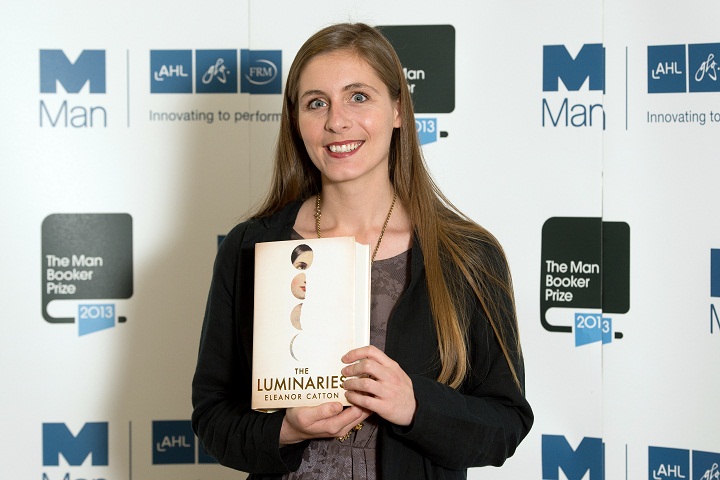LONDON – Youth and heft triumphed at the Booker Prize on Tuesday, as 28-year-old Ontario-born, New Zealand-based author Eleanor Catton won the fiction award for “The Luminaries,” an ambitious 832-page murder mystery set during a 19th-century gold rush.

The choice should give heart to young authors of oversized tales. Catton is the youngest writer and only the second New Zealander to win the prestigious award – and her epic novel is easily the longest Booker champion.
In her acceptance speech, she thanked her editors, her agent and her publishers – Granta in London and Victoria University Press in New Zealand – for not putting pressure on her while writing her novel.
“I was free, throughout, to concern myself with questions not of value but of worth. This is all the more incredible to me, because ‘The Luminaries’ is and was, from the very beginning, a publisher’s nightmare,” she said.
“The shape and form of the book made certain kinds of editorial suggestions not only mathematically impossible but even more egregious, astrologically impossible.”
Travel writer Robert Macfarlane, who chaired the judging panel, called “The Luminaries” “dazzling” and “luminous.”
“It is vast without being sprawling,” he said.
“You begin it, feel you are lost, think you are in the clutches of a big, baggy monster … but soon realize you are in something as tightly structured as an orrery,” a device for measuring the planets.
“It is beautifully intricate without being fussy,” Macfarlane said. “It is experimental … but does not by any means neglect the traditional virtues of storytelling.”
Catton had been bookmakers’ joint favourite among the six prize finalists, alongside British novelist Jim Crace, for his rural parable “The Harvest.”
She also beat Ireland’s Colm Toibin, Indian-American writer Jhumpa Lahiri, Zimbabwe’s NoViolet Bulawayo and B.C.-based author Ruth Ozeki.
Catton received her trophy, which comes with a 50,000 pound (C$83,000) cheque, from Prince Charles’ wife Camilla, the Duchess of Cornwall, during a dinner ceremony at London’s medieval Guildhall.

Get daily National news
Catton was born in London, Ont., while her father was studying at the University of Western Ontario but left for New Zealand at age six.
“The Luminaries” centres on a man named Walter Moody who comes to a New Zealand prospecting town in 1866 and finds himself immersed in a web of saloons, seances and skullduggery.
The book’s elaborate narrative is structured according to astrological charts: It consists of 12 sections, each half the length of the last, from a 360-page opener to a final chapter of a single page.
Macfarlane said the novel “requires a huge investment from the reader” but delivers big returns. “It begins in fixity and then it accelerates out of it, and once you are on the down slope, the pace is irresistible,” he said.
He said it was a book that “takes place in a culture which is utterly capitalized” and focused on money, but also dwells on tenderness and love.
Macfarlane said the panel of five judges met for two hours – brief by Booker standards – to choose the winner, which was decided without a vote. “No blood was spilled in the judging,” he said.
Catton, who was 25 when she started writing the book and 27 when she finished it, has published just one previous novel. Now she has won a prize that brings a huge boost in profile, publicity and sales, and whose laureates include V.S. Naipaul, Julian Barnes and Hilary Mantel.
The only previous New Zealand winner is Keri Hulme, who took the Booker in 1985 for “The Bone People.”
Catton’s win comes less than a week after Canadian short story master Alice Munro won the Nobel Prize for literature.
Canadian author Yann Martel shot to international fame after he won the Booker in 2002 for “Life of Pi,” which was adapted into an Oscar-winning film last year, while other Canadians who’ve won the Booker include Margaret Atwood in 2000 for “The Blind Assassin” and “The English Patient” author Michael Ondaatje, who shared the prize in 1992 with Barry Unsworth.
This is the last year that the Booker – founded in 1969 and officially named the Man Booker Prize after its sponsor, financial services firm Man Group PLC – will be open only to writers from Britain, Ireland and the Commonwealth of former British colonies.
Beginning next year, Americans and other English-language writers will be able to enter as well.
The rule change aims to expand the global scope of the Booker even further, although some fear it may alter the delicate chemistry of the prize.
Macfarlane said “The Luminaries” was a fitting winner – “a global novel that is always intensely local.”
And its sheer size – eight times the length of Toibin’s 104-page “The Testament of Mary” – had an added benefit for the judges.
“Those of us who didn’t read it on e-readers enjoyed a full upper-body workout,” Macfarlane said.







Comments